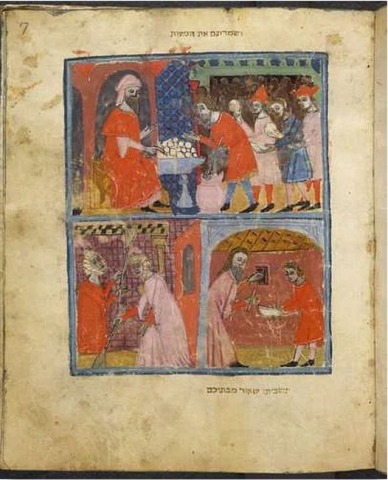
The Underground Thomist
Blog
PassoverTuesday, 04-23-2024
To all my Jewish students, colleagues, friends, and readers, I wish a good and happy Passover today. In view of the great danger and hatred which are being directed against Jewish people all over the world, including, to my sorrow, our own country, I also wish you a safe one. The following passages of Scripture, shared by your tradition and mine, have been quoted in this blog before, but I will never forget them. Now the Lord said to Abram, “Go from your country and your kindred and your father’s house to the land that I will show you. And I will make of you a great nation, and I will bless you, and make your name great, so that you will be a blessing. I will bless those who bless you, and him who curses you I will curse; and by you all the families of the earth shall bless themselves.” Pray for the peace of Jerusalem! May they prosper who love you! Peace be within your walls, and security within your towers! For my brethren and companions’ sake I will say, “Peace be within you!” For the sake of the house of the Lord our God, I will seek your good. (Genesis 12:1-3; Psalm 122:6-9)
|
The Incoherency of MaterialismMonday, 04-22-2024
Query:You’ve argued that if the materialistic view were correct, then our cognitive faculties would have developed solely to maximize the chances of gene transmission, not to maximize truth. In this case we would have no reason to think that our reasoning is reliable, and so we would have no reason to think that any view (including the materialistic view) is correct. But if materialism is not correct, then we don’t have this problem. I agree with you that we are justified in relying on our faculties without being able to show that they are justified, but I have doubts about this bit of reasoning. As you know, C.S. Lewis proposed it, and Alvin Plantinga has been pushing something like it for a long time, but here’s my problem. Let us suppose that we are hard-wired to get things wrong sometimes. Then yes, perhaps the reasoning that leads us to believe in naturalism is infected in this way. But these suppositions are still not enough to get the conclusion that we can’t trust the reasoning that led us to believe in materialism. We need, in addition, an argument to show that the reasoning for materialism is of just the sort that our evolutionary heritage makes problematic.
Reply:I see your point, but if we really were hard-wired to get things wrong sometimes, then I don’t think your suggestion would get the materialist off the hook. You say that all he would need is an argument, P, to show that his argument for materialism, M, is not vitiated by how we are wired. But then wouldn’t he also need an argument, Q, to show that his argument P is not vitiated by it either? He would merely have embarked on an endless regress. As I see the matter, unless we can already be sure that we know something, we aren’t in a position to criticize the faculties by which we know them. For this reason, a classical thinker – say, Aristotle or Thomas Aquinas -- doesn’t demand a critique of the power to know anything before we concede that we know something. Instead he begins by asking, “Granted that we do know something, what must the universe be like for this to be the case?” And it turns out to contain not just matter but other things too. But the materialist holds that nothing is real but matter. So he has to ask a different question: “What reason have I to trust my faculties if materialism is true?” And it turns out that he hasn’t any. So although a classical thinker is justified in relying on his faculties without being able to show that they are justified, a materialist who makes such a claim for himself is trying to have his cake and eat it.
|
Spanking -- A Grain of SaltMonday, 04-15-2024
Query:I have been brought up under the impression that the Bible not only permits, but even glorifies spanking of naughty children. It is implied that the punishment is an act of love, as it will be good for the child. It is even said that one who does not spank, hates his child. Certainly this is the prima facie teaching of the book of Proverbs: “He who spares the rod hates his son, but he who loves him is diligent to discipline him.” “Discipline your son while there is hope; do not set your heart on his destruction.” “The rod and reproof give wisdom, but a child left to himself brings shame to his mother.” The letter to the Hebrews seems to go even further by teaching how God disciplines us in an analogous way as our earthly fathers have, with the same goal of harvesting righteousness through painful punishment: “And have you forgotten the exhortation which addresses you as sons? – My son, do not regard lightly the discipline of the Lord, nor lose courage when you are punished by him. For the Lord disciplines him whom he loves, and chastises every son whom he receives. It is for discipline that you have to endure. God is treating you as sons; for what son is there whom his father does not discipline? ... For the moment all discipline seems painful rather than pleasant; later it yields the peaceful fruit of righteousness to those who have been trained by it.” This makes it seem like parents spanking their children would be actually following the example of the perfect love of God. However, this teaching seems to be in direct contradiction with the recent findings of social science. Could you comment on the scientific validity of such studies? If the science is right, then is the Scriptural teaching mistaken? Or have I misunderstood it? If so, why is it so easy to get it wrong?
Reply:I take the texts you mention to mean, broadly, that parents who do not discipline their children are asking for trouble later on. From the fact that some of the texts refer to specific forms of discipline, I don’t understand the texts as requiring the employment of just these modes of discipline. In a culture in which, say, a switch is the most common way to punish disobedient children, it would be natural to refer to discipline in general by the phrase “the switch.” We speak that way even in contexts in which it is obvious that we do not intend to be taken literally; for example, we may say that a worker was “taken to the woodshed” by his supervisor, even though no workers are literally taken to any woodsheds. So, if I am reading the texts correctly, it would not be a violation of biblical teaching for a parent to forgo corporal punishment if another form of punishment turned out to work better with his child. The point is that discipline is neglected only to the child's peril. As to the empirical question -- how well does corporal punishment work? -- I don’t know, but I would hesitate to leap to broad conclusions from recent research when I don’t know whether they controlled for cultural expectations, or even what they meant by corporal punishment. Beating up children is obviously wrong. Giving a child’s butt a whap or two with a paddle – as was done with miscreants in my high school – is a very different thing. My own experience makes me a bit suspicious, just because different children respond differently to the same punishments. Some children do respond badly to spanking. Some don’t. There are some surprises with older people too. It would never happen today – but I know a man, a retired city planner, who blesses the day one of his college ROTC instructors grabbed him, took him over his knee -- and swatted his behind for not taking his studies seriously! To be a young adult, and yet be treated like a spoiled child, shocked him out of a deepening pattern of slack and irresponsible behavior. I would never do that to a student, nor would I ever recommend doing it. (Hear that, O my administrators?) I wouldn’t have reacted as he did either. But he swears that it changed his life. Interesting. And as to resentment, do you know what? My own students sometimes resent me just for giving them grades less than B for their essays. Yet I haven’t found that it works better to give them all As.
|
EsotericismMonday, 04-08-2024
For members of a certain esotericist school of thought, Exhibit One is Plato’s Republic. They take to an extreme the commonplace observation that Plato makes his character Socrates speak ironically. According to them, the Republic hides Plato’s disturbing real teaching behind a comforting, conventional teaching that does not even come close to representing what he actually believes. We are told that all the great philosophers wrote in this way. But a disturbing esoteric teaching hidden behind a comforting surface teaching is the opposite of what we actually find. Socrates puts his most radical proposals front and center: Community of property, community of wives, “noble” lies, and the same way of life for men and women. What the esotericists consider his hidden teaching -- that since a perfect regime is impossible, we ought to practice moderation – is not subversive. So what esotericists say publicly contains a contradiction. If I reasoned about them as they reason about great thinkers – which I think is how they would like to be viewed – then I would regard the contradiction as a deliberately planted clue that it is they, not the ancients, who write esoterically. The reassuring, conventional counsel of moderation is just a cover story, and their real view is radical and disturbing. But of course that couldn’t be true, could it? Related:LabyrinthSo-Called Self-Ownership
|
A Few DropsSunday, 03-31-2024
Many indeed are the miracles of that time: God crucified; the sun darkened and again rekindled; for it was fitting that the creatures should suffer with their Creator; the veil rent; the Blood and Water shed from His Side; the one as from a man, the other as above man; the rocks rent for the Rock's sake; the dead raised for a pledge of the final Resurrection of all men; the Signs at the Sepulchre and after the Sepulchre, which none can worthily celebrate; and yet none of these equal to the Miracle of my salvation. A few drops of Blood recreate the whole world, and become to all men what rennet is to milk, drawing us together and compressing us into unity. -- Gregory Nazianzen, Oration 45 (the Second Oration on Easter)
|
Is Dropping a Friend a Sin?Monday, 03-25-2024
This letter was from a high school student – and this is fourth (and last, for now) in a short series of reruns of old columns which I wrote many years ago, as the fictional Professor Theophilus, in an online magazine for Christian college students. Several people have been kind enough to say that my Ask Theophilus columns kept them sane in those days.
Question:I have two girl friends whom I met only a week ago. They claim to be Christian, and I believe them -- I know for a fact that they attend and are active at church. My problem lies in the fact that they do not behave or talk in godly ways. I am often left feeling very uncomfortable around them because their behavior is at odds with mine. They know I see things differently, and they know what they do bothers me, but I try my best to be polite and kind. Would I be a snob to discontinue my friendship with them because of how I feel about their behavior? Should I even consider not being their friend?
Reply:It's all right to drop one-week acquaintances who make you uncomfortable. If they had been long-time friends, some explanation might be necessary, but that's not the case. You don't have to make an announcement; you just avoid seeing them socially. Of course, we all struggle with temptation to sin, so it would certainly be hypocritical if we insisted on associating only with perfect people. However, that doesn't mean that you have to put up with anything from anybody. There is no obligation to continue in that special relationship called "friends." Breaking up confuses a lot of young Christians, because Christian social life is based on love -- and isn't love supposed to be forever? It all depends on which kind of love you mean. Some loves are forever: God's love for His people, the love of His people for Him, and their brotherly love for each other. Other loves are at least lifelong: Kinship, marriage and a few other relationships, usually based on vows. But most bonds aren't like that. Business partners, whose relationship is based on profit, don't have to do business until death. Roommates, whose relationship is based on convenience, don't have to share rent until death. What is your relationship with the two girls? I'd call it being pals -- the kind of friendship based on mutual liking. But it isn't a sin to stop liking. One thing to remember: Even if you do stop having friend-love for someone, you have to go on having neighbor-love. You have to continue being honest, fair and kind to him; you have to continue desiring good for him and you have to keep from seeking revenge or spreading gossip. Even if he acts like a rat! By divine standards, we're often pretty ratty. That's why we need God's mercy.
|
The Fog of, Um, WarMonday, 03-18-2024
This is the third in a short series of reruns of old columns which I wrote many years ago, as the fictional Professor Theophilus, in an online magazine for Christian college students. Several people have been kind enough to say that my Ask Theophilus columns kept them sane in those days.
Query:My girlfriend and I have been dating for almost a year. Although we're not yet engaged, we're not just dating for the heck of it -- I think the relationship is marriage-bound. We're both Christians, and both committed to remaining virgins until marriage. The problem is that we've become more and more physically intimate. I'd call the present level “heavy making out.” This crosses serious ethical and spiritual lines for both of us. We know we’ve messed up and can't continue in this behavior. The question is, what do we do next? Break up? Not touch at all? Or what?
Reply:It's nice to have an easy question for a change! No, you don't have to break up, and you don't have to avoid touching at all. But you do need to know what to avoid, and you do need to know how to be successful in avoiding it. You may think you already know what to avoid -- after all, you've just told me that you didn't avoid it. But let's review anyway. What to avoid? Avoid intercourse (of course), avoid whatever resembles intercourse (for example oral sex), and -- this is the important one to remember -- avoid whatever gets your motor running for intercourse. The God-given purpose of sexual arousal is to prepare the two spouses for intercourse, and it achieves that purpose so well that once arousal happens, intercourse tends to follow. Holding hands with your girlfriend while walking across campus probably doesn't put you in that condition, but other things do, and they are the things to avoid. I know that you know what they are, because, of course, that's why you do them -- arousal is enjoyable. The problem is that arousal can't be “used” as recreation. You can't turn on the rocket motors and then tell the rocket not to lift off. Besides, that behavior just isn't pure; arousal should be saved for your wife. Why? For the same reason that intercourse should be. And your girlfriend isn't your wife yet. How to be successful in avoiding it? Don't wait until you're aroused to ask yourself “Am I becoming aroused?” Why not? Because you'll be tempted to give yourself a dishonest answer. Instead, make a list of things not to do so that your decision is already made ahead of time -- then just don't do them. Does something get your motor running? Put it on the list. Is something difficult to stop doing? That's really the same question asked a different way. Put it on the list too. Whatever she thinks gets your motor running and whatever she thinks you find it hard to stop -- don't argue; write those things too. And of course she follows the same steps, putting herself in your place and you in her place. Second, don't trust that will power alone will be enough to keep you on the right side of the line. We aren't made that way. Just as the purpose of arousal is to prepare the two spouses for intercourse, so the purpose of being alone together is to prepare the two spouses for arousal. Logically, what follows? You should simply avoid being alone together! Of course I don't mean you can't ride in an elevator together, but you shouldn't be all by yourselves for extended periods of time. Here are some examples. Have dates in public places, like restaurants, not in secluded places like her apartment or that lonely spot in the park. If you want to watch a DVD together at your girlfriend's place, okay, but invite a couple of other friends over to watch it with you. When they leave, you leave -- and at the same time. See where I'm going? I think you'll find that following this advice puts your whole relationship on a different plane. It makes it possible to find out how you really feel about each other without the fog of arousal -- which is every bit as confusing as the fog of war.
Afterword:The author of the letter wrote back to thank me for the advice and say “You've probably saved my girlfriend and me from an imminent breakup.” Isn't that interesting? People are always imagining that sex preserves non-marital relationships. Actually, sex confuses them. Purity preserves them.
|






